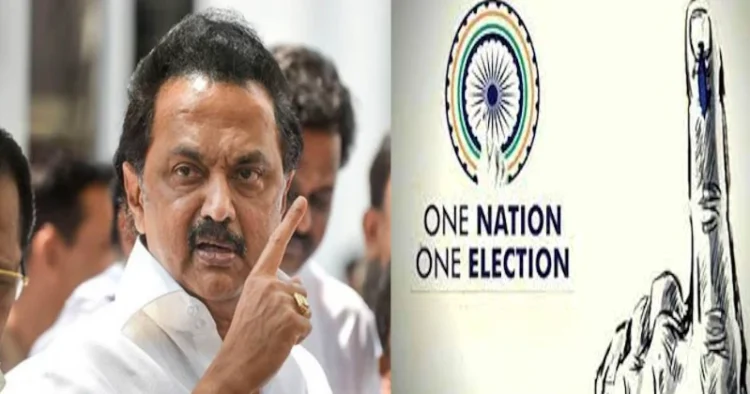The DMK Government, adhering to the Dravidian Model, opposes various initiatives of the Union Government, engaging in confrontations with constitutional authorities. Its stance includes opposition to measures such as the National Education Policy (NEP), Goods and Services Tax (GST), and the abrogation of Article 370 in Kashmir, among others. This trend is observed in several non-BJP states like West Bengal, Kerala, Tamil Nadu, Delhi AAP, and Punjab Governments. While adopting a combative stance against the Centre may temporarily deflect attention from their shortcomings, it ultimately undermines the state’s welfare and erodes public trust.
On the February 14, the Tamil Nadu legislative assembly passed two resolutions opposing the proposed delimitation exercise and the ‘One Nation One Election’ system, both receiving widespread support. Chief Minister MK Stalin emphasised the impracticality of the One Nation One Election’ concept, citing the diverse issues addressed in elections at various levels across India’s vast and diverse landscape.
“The concept of ‘One Nation, One Election’ is entirely impractical and contradicts a fundamental feature of the Constitution. It goes against the Constitutional assurance of conducting independent, free, and fair elections,” he stated. He further emphasised the critical political circumstances that necessitated resolutions on issues causing concern among the populace and the nation. Calling ‘One Nation, One Election’ the most arbitrary idea, he urged strong opposition against it. He also condemned the attempt to diminish Tamil Nadu’s elected representatives through census-based delimitation, stressing the need for collective resistance against both measures as they undermine democracy.
Chief Minister Stalin expressed concerns over the ‘One Nation, One Election’ proposal, highlighting potential risks such as the dissolution of state assemblies in an arbitrary manner. He questioned the feasibility of simultaneous elections at all levels of governance and emphasised that such a move would infringe upon the rights of states. He urged vigilance against the self-serving agenda of the central government, predicting its rejection by both the people and the process of constituency delimitation. Stalin underscored the historical context of constituency delimitation, citing its suspension until 2001 and subsequent extension until after 2026. He characterised Tamil Nadu’s stance as a firm opposition to the BJP-led Union Government’s perceived authoritarian tendencies.
In a video from September, Annamalai responded to MK Stalin’s concerns by referencing DMK patriarch and former CM M Karunanidhi’s support for the ONOP in 1971.
Stalin criticised the delimitation exercise, labeling it as a ‘punishment’ for states with smaller populations. He emphasised, “We cannot accept delimitation based solely on the census, as it penalises states that effectively implement population control measures.” He advocated for maintaining the current ratio of constituencies between States in State assemblies and both houses of Parliament, fixed based on the population of 1971. According to him, adjusting representation solely based on population numbers would undermine democracy’s essence and exacerbate existing opposition.
Stalin highlighted the disparity between Tamil Nadu and Bihar’s population growth since 1971, expressing concerns that delimitation could diminish Tamil Nadu’s representation in Parliament relative to northern states. He suggested that reducing parliamentary seats in southern states like Tamil Nadu might be a deliberate strategy. DMK’s allies, including Congress, VCK, MDMK, and left parties, supported the resolutions, while AIADMK backed the resolution against delimitation. BJP MLA Vanathi Srinivasan dismissed concerns raised in the resolution as unfounded and opposed holding simultaneous elections for local bodies alongside Lok Sabha and Assembly polls.

















Comments